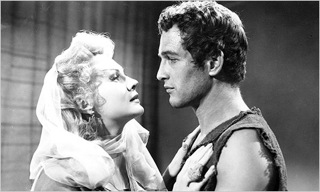A while ago, during a radio seminar tour of the UK, I happened to see an issue of the British newspaper, The Guardian, which featured tidbits from INVERNE’S STAGE AND SCREEN TRIVIA by James Inverne.
They unknowingly demonstrated the power of what I call Contextual Programming….vs. the lack of context provided for the information they presented.
Here are two of the items that caught my eye:
“Paul Newman was so ashamed of his performance in THE SILVER CHALICE (1954) that he took out a large advert in Variety, the movie industry magazine, apologising for it.”
and
“Ryan O’Neal almost was cast in the lead role of ROCKY.”
How interesting does each of those items seem to you?
Here’s how they strike me:
One is slightly interesting. The other is misleading — and less interesting than the real story.
Based upon your reading of the excerpt (#1, above), when would you guess Paul Newman published his apology? (Go ahead, take a moment to reread the paragraph.)
1954?
Nope.
Try 1969.
When the movie was released in 1954, Newman wasn’t yet a star. It was, in fact, his film debut.
In 1969, a television station in Los Angeles capitalized on Newman’s by-then superstar status by airing THE SILVER CHALICE every night for a week.
And that’s when Newman took out a full-page ad declaring, “Paul Newman apologizes every night this week.”
It’s still not a big story. But which is more interesting, more fun? The story as related in the Guardian — related without establishing any kind of context? Or the second version, the one that did establish a context in which to frame the story?
What about the second example?
“Ryan O’Neal almost was cast in the lead role of ROCKY” makes it sound as though he was one of the actors considered, but finally the studio chose Sylvester Stallone.
The fuller context is this:
Stallone was a struggling actor who had written an original screenplay.
The screenplay was terrific, and a major Hollywood studio wanted to buy it for $75,000. That was a lot of money for an unknown actor 35 years ago.
Only one problem: Stallone insisted on playing the lead.
No way was United Artists going to cast a complete unknown in this movie. It would star a “name” actor — Ryan O’Neal. James Caan. Robert Redford. Burt Reynolds.
The studio increased the offer to $100,000.
$150,000.
Stallone stood firm.
$200,000.
Imagine being a struggling actor, with a major studio offering you $200,000 for your screenplay.
Especially when you previously had written 32 other screenplays — none of which anyone ever considered buying.
$250,000.
Stallone told them, “The only way I’ll let you make this movie is if I play the lead.”
Finally, United Artists agreed to make the film with Stallone as its star. But only on the condition that they pay only the Writer’s Guild minimum for the screenplay and the Screen Actor’s Guild minimum for Stallone’s performance.
The entire movie was shot in 28 days, with a budget of just one million dollars. (A million dollars wouldn’t have bought Robert Redford for 28 hours.)
It went on to gross over $100,000,000.
Stallone received Academy Award nominations that year for Best Actor and for Best Original Screenplay.
Not a bad on-air trivia question, huh?
But if you provide the bare fact — “Ryan O’Neal almost was cast in the lead role of ROCKY” — without the benefit of the context, it becomes merely trivial.
Moral
If you simply recite “trivia,” your radio show becomes trivial.
But if you establish a context that makes the information come alive, your radio program comes alive.




